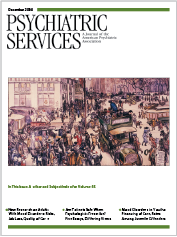Carrie Fisher's The Best Awful features Suzanne Vale, the strung out actress of Fisher's earlier novel, Postcards From the Edge. However, the supporting cast is entirely new. In this book, Suzanne has acquired both an ex-husband and a daughter; in addition, she now has a mental illness—bipolar disorder—along with her mostly tamed substance abuse. The story itself is rather one-dimensional, following Suzanne's rise into mania, fall into depression, and subsequent recovery of sorts; psychiatrists, therapists, and the psychiatric hospital are portrayed not as villains or heroes but as almost incidental. Furthermore, the plot is thin and the ending both obtuse and jarring.
Nonetheless, Suzanne's story makes fun reading, especially for those of us with an interest in mental illness. It is hard not to become intrigued by her trajectory as she spins manically out of control. The sophisticated reader can't help playing doctor and anticipating the outcome. If this were nonfiction, the story would be both familiar and predictable, diagnosis buried in substance abuse for many years, medication noncompliance, mercuric rise into mania, shattering fall into depression. So one reads wondering, will Ms. Fisher get it right? The answer is a satisfying yes. As much as the novel is thin, the experience of a woman with bipolar disorder is rich. First comes Suzanne's oh-so-human decision to start skipping some of her medication so she can get "a little" manic. Before too long, she all out abandons medication, becoming devious, deceptive, and quick to make empty promises. For those of us on the prescribing end, it is startling to see how easily and carelessly we are duped. Then there is the too-close-to-home-to-be-funny but otherwise hilarious description of her manic tear and the inevitable devastating depression that follows.
The book is also sprinkled with many of Suzanne's own thoughts about her illness. She reflects on mania, "If this was what it was like to be bipolar then the bank error was in her favor! Far from experiencing it as a handicap, it felt like an advantage giving her the edge. Mental Illness? Why she couldn't remember feeling so well." And on depression: "This she recognized as a kind of sickness, an evil infecting her every cell. This dark beast covered her in misery and drained the light from her universe."
In my opinion, it is Fisher's capturing of the experience of mental illness that makes this book worth reading. Here is an opportunity to get an uncensored look inside our patients' heads. I think it is helpful to see things so completely from the other side; Suzanne's life is so intertwined with her mental illness that it is completely normal to her. Why should she take medication to "treat" herself? Isn't this what we hear from patients all the time? Patients and doctors alike could benefit from seeing that treating mental illness involves a trade-off. As Suzanne puts it, "Oh she was still her but in another sense, not her. She would surely never be as she had been. And that was a good thing, wasn't it?" We who would foist "treatment" on others would be well advised to keep this question in mind as we help our patients make treatment decisions. For this reason, I would recommend this book to colleagues and my own patients, although probably not to my friends.

